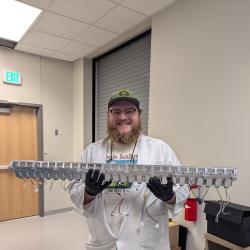The Secrets Atoms Hold, Part 1: Search for Dark Matter
There’s a big unsolved mystery in physics: The cosmic balance sheet for matter in our universe just doesn’t add up. Galaxies all over space move as though they are much heavier than they appear. Scientists postulate that they are full of stuff we cannot see, stuff that they call dark matter.
To figure out what that stuff might be, scientists have turned their attention to atoms, which are familiar, well-understood, and in abundant supply right here on Earth. Atoms have regular heartbeats that can be measured extremely precisely in experiments, and some theories about dark matter suggest that its interactions with normal matter might change the frequency of this telltale ticking. Checking whether atoms ever skip a beat can tell us whether dark matter is present, and it might even reveal that things we’ve come to think of as constant—like the speed of light or the charge of the electron—are actually changing ever so slightly over time.
In this episode of Relatively Certain, Dina Genkina sits down with JQI Adjunct Fellow Marianna Safronova, a physics professor at the University of Delaware, and JQI Fellow Charles Clark, an adjunct professor of physics at UMD and a fellow of the National Institute of Standards and Technology, to talk about how precision measurements with atoms might shed some light on matter that’s otherwise dark.
This episode of Relatively Certain was produced by Dina Genkina, Chris Cesare, and Emily Edwards. Music featured in this episode includes Picturebook by Dave Depper, Future You by Chad Crouch, Surge and Swell by Pictures of the Floating World, and The Beauty of Maths by Meydn. Relatively Certain is a production of the Joint Quantum Institute, a research partnership between the University of Maryland and the National Institute of Standards and Technology, and you can find it on iTunes(link is external), Google Play, Soundcloud(link is external) or Spotify(link is external).







